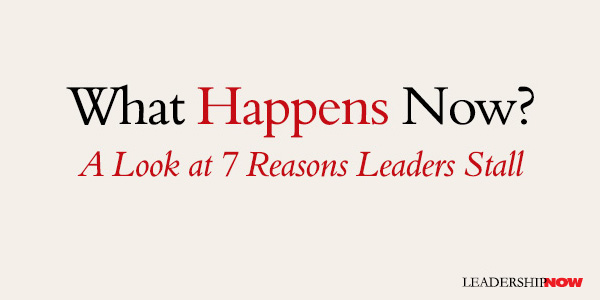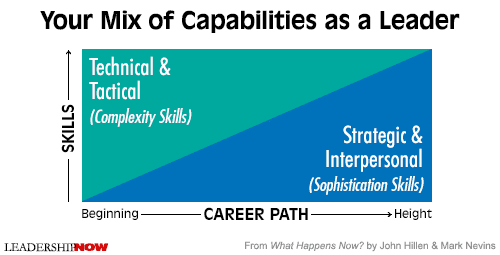 |
 |
09.25.18

What Happens Now? A Look at 7 Reasons Leaders Stall
T As you take on more responsibility, the demands on you as a leader change. If disrupting yourself isn’t part of who you are, you will get left behind. If you are just doubling down on what you’ve always done, you will miss the opportunities. When conditions change, you have to change too. That’s why John Hillen and Mark Nevins wrote What Happens Now? to help you remain a leader. “If we are to generalize, we can say that you advance as a leader, the technical and tactical skill you need—distribution expertise, for example—pale in comparison to the strategic and interpersonal.” Complexity Skills and Sophistication Skills They divide leadership capabilities into two groups: complexity skills and sophistication skills. Complexity skills are often what got you in the door. Complexity skills are those abilities that help you to deal with complexity “in a traditional-management-centered way, such as knowing how to design and implement processes and systems, and having the required technical and functional knowledge.” Sophistication skills are behavior and mindset related. They are about changing how you do what you do. “How you pull back and understand the bigger realities of the job. How you approach doing the job having done so. How you think and behave so your people eagerly receive your leadership. Getting the how right is the challenge when it comes to sophistication.” Too often, we don’t look at ourselves when we run into problems. We look around and ask what’s wrong with them. Warren Bennis and James O’Toole wrote, “Most of us wear the concrete shoes of our earlier successes.” We tend to focus on and fall back on Complexity skills rather than grow and develop our Sophistication skills. Complex challenges are easier to wrap your mind around. You can measure them. Sophistication challenges are not as clear. They can be more painful as they get into more personal aspects of who you are as a person. But distinguishing between the two challenges is critical. Our leadership stalls when we try to use tools for solving complexity issues when we “need to develop the capabilities to lead in a more sophisticated way.” Complexity challenges, which often come with growth in scale, can make your job bigger in ways you can’t anticipate. Sophistication challenges, which usually come with change in kind, make the job broader in ways you don’t anticipate. If you’re like most leaders, you’ll display more comfort with complexity and decidedly less comfort with sophistication.  As you rise as a leader, sophistication skills take on greater importance. What are the new capabilities on which your leadership success will depend? More importantly, which skills that you value today should you deemphasize—or resist exercising at all? No matter how good your complexity skills are if you fail to access your sophistication skills by regularly challenging yourself as to what and how you do what you do, you risk stalling as a leader. The authors identify seven inflection points that can trigger a stall in your leadership. Purpose Stall
Teamwork Stall
Stakeholder Stall
Leading Change Stall
Authority Stall
Focus Stall
Leadership Development Stall
What Happens Now? is a great look at some of the most critical issues in leadership. The authors walk you through each of these stalls to help you overcome or avoid them. Of course, self-awareness is key here—understanding the impact you have on others. Elevate your view and understand where you are and determine where you need to be. They call for a three-part approach: become more aware of what’s changing in your environment, know where you are, and then act deliberately to develop capabilities that will change your behaviors and thinking. Every stall is an opportunity for growth. When you deal with each stall head-on, “you position yourself to evade the pain and consequences of being caught in future stalls. When you ask yourself, ‘What happens now?’ you’ll be ready to answer: ‘I will look inside, see myself as others see me and as they want and need me to be, and act to remake myself.’ You won’t blame your troubles on your organization or people, or ask, ‘How do I change the institution to overcome these challenges?’ You’ll see yourself as part of the slowdown. And then you’ll be ready to become you own ‘Best Leader Ever.’” This is not a process of abandoning the complexity skills that got you where you are, but instead adding to and developing “your leadership repertoire with a new set of executive capabilities, mindsets, and behaviors” to help you to overcome the new challenges of sophistication that will come your way. 
Posted by Michael McKinney at 10:00 AM
|
BUILD YOUR KNOWLEDGE
 

How to Do Your Start-Up Right STRAIGHT TALK FOR START-UPS 
Grow Your Leadership Skills NEW AND UPCOMING LEADERSHIP BOOKS 
Leadership Minute BITE-SIZE CONCEPTS YOU CAN CHEW ON 
Classic Leadership Books BOOKS TO READ BEFORE YOU LEAD |